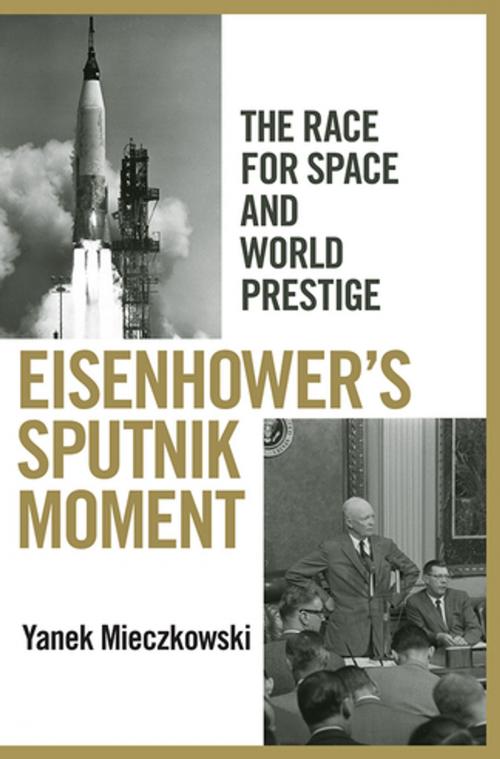Eisenhower's Sputnik Moment
The Race for Space and World Prestige
Nonfiction, History, Americas, United States, 20th Century| Author: | Yanek Mieczkowski | ISBN: | 9780801467929 |
| Publisher: | Cornell University Press | Publication: | April 15, 2013 |
| Imprint: | Cornell University Press | Language: | English |
| Author: | Yanek Mieczkowski |
| ISBN: | 9780801467929 |
| Publisher: | Cornell University Press |
| Publication: | April 15, 2013 |
| Imprint: | Cornell University Press |
| Language: | English |
In a critical Cold War moment, Dwight D. Eisenhower’s presidency suddenly changed when the Soviet Union launched Sputnik, the world’s first satellite. What Ike called "a small ball" became a source of Russian pride and propaganda, and it wounded him politically, as critics charged that he responded sluggishly to the challenge of space exploration. Yet Eisenhower refused to panic after Sputnik—and he did more than just stay calm. He helped to guide the United States into the Space Age, even though Americans have given greater credit to John F. Kennedy for that achievement.
In Eisenhower’s Sputnik Moment, Yanek Mieczkowski examines the early history of America’s space program, reassessing Eisenhower’s leadership. He details how Eisenhower approved breakthrough satellites, supported a new civilian space agency, signed a landmark science education law, and fostered improved relations with scientists. These feats made Eisenhower’s post-Sputnik years not the flop that critics alleged but a time of remarkable progress, even as he endured the setbacks of recession, medical illness, and a humiliating first U.S. attempt to launch a satellite. Eisenhower’s principled stands enabled him to resist intense pressure to boost federal spending, and he instead pursued his priorities—a balanced budget, prosperous economy, and sturdy national defense. Yet Sputnik also altered the world’s power dynamics, sweeping Eisenhower in directions that were new—even alien—to him, and he misjudged the importance of space in the Cold War’s "prestige race." By contrast, Kennedy capitalized on the issue in the 1960 election, and after taking office he urged a manned mission to the moon, leaving Eisenhower to grumble over the young president’s aggressive approach.
Offering a fast-paced account of this Cold War episode, Mieczkowski demonstrates that Eisenhower built an impressive record in space and on earth, all the while offering warnings about America’s stature and strengths that still hold true today.
In a critical Cold War moment, Dwight D. Eisenhower’s presidency suddenly changed when the Soviet Union launched Sputnik, the world’s first satellite. What Ike called "a small ball" became a source of Russian pride and propaganda, and it wounded him politically, as critics charged that he responded sluggishly to the challenge of space exploration. Yet Eisenhower refused to panic after Sputnik—and he did more than just stay calm. He helped to guide the United States into the Space Age, even though Americans have given greater credit to John F. Kennedy for that achievement.
In Eisenhower’s Sputnik Moment, Yanek Mieczkowski examines the early history of America’s space program, reassessing Eisenhower’s leadership. He details how Eisenhower approved breakthrough satellites, supported a new civilian space agency, signed a landmark science education law, and fostered improved relations with scientists. These feats made Eisenhower’s post-Sputnik years not the flop that critics alleged but a time of remarkable progress, even as he endured the setbacks of recession, medical illness, and a humiliating first U.S. attempt to launch a satellite. Eisenhower’s principled stands enabled him to resist intense pressure to boost federal spending, and he instead pursued his priorities—a balanced budget, prosperous economy, and sturdy national defense. Yet Sputnik also altered the world’s power dynamics, sweeping Eisenhower in directions that were new—even alien—to him, and he misjudged the importance of space in the Cold War’s "prestige race." By contrast, Kennedy capitalized on the issue in the 1960 election, and after taking office he urged a manned mission to the moon, leaving Eisenhower to grumble over the young president’s aggressive approach.
Offering a fast-paced account of this Cold War episode, Mieczkowski demonstrates that Eisenhower built an impressive record in space and on earth, all the while offering warnings about America’s stature and strengths that still hold true today.















